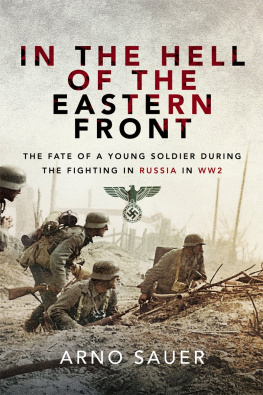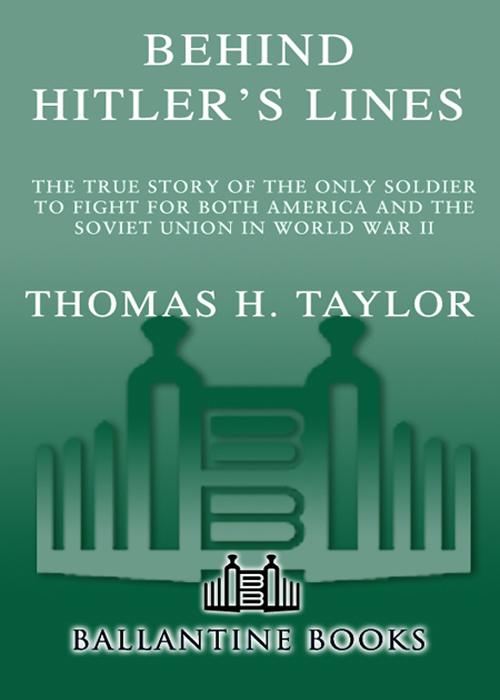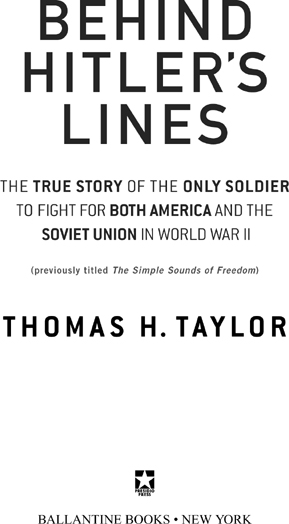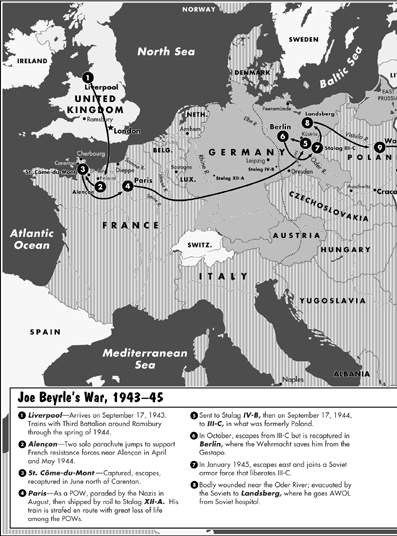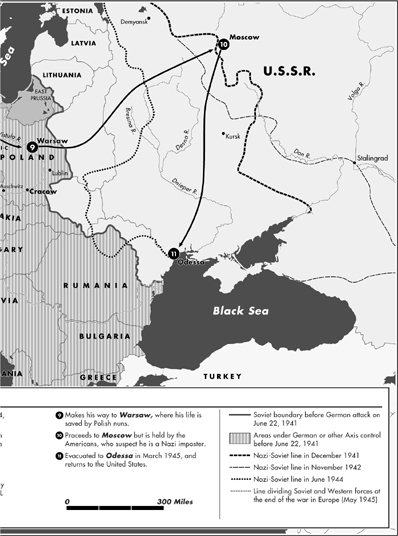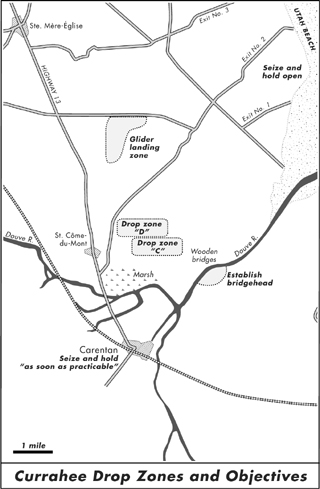Praise for Behind Hitler's Lines
Remarkable Without a doubt, one of the most incredible stories you will ever read.
The Roanoke Times
Every once in a while, a true story comes along that reads like fiction. [This book] is a remarkable true story about a remarkable American soldier. It grabs you on page one and never lets go. That Joe Beyrle survived the horror of the German stalags and the Gestapo to escape and continue fighting against Hitler with the Russian army is a testament to the training and professionalism of the Screaming Eagles of the 101st Airborne Divisionand to the courage and fierce determination of the kind of men who served in that storied unit. One of the most gripping tales of war you will ever read, and it will be read for generations to come as a tribute to the inextinguishable love of country and love of freedom of one resilient American, Joe Beyrle.
SENATOR CARL LEVIN, chairman of the U.S. Senate Armed Services Committee
It is a tale of courage and daring, torture and escape, of going to hell and coming back, of survival against the worst odds: a soldier imprisoned; a paratrooper forced to the ground.
The Grand Rapids Press
Amazing This is not just another war story. It is a history lesson about courage, fear, perseverance, revenge and redemption.
Muskegon Chronicle
Also by Thomas H. Taylor
NONFICTION
RANGERS, LEAD THE WAY
LIGHTNING IN THE STORM
WHERE THE ORANGE BLOOMS
FICTION
A-18
A PIECE OF THIS COUNTRY
BORN OF WAR
Books published by The Random House Publishing Group are available at quantity discounts on bulk purchases for premium, educational, fund-raising, and special sales use. For details, please call 1-800-733-3000.
In June 1994, on the fiftieth anniversary of D Day, President Clinton looked out on the American Cemetery at Colleville-sur-Mer in Normandy and spoke these dedicatory words:
ACKNOWLEDGMENTS
FOR CHAPTERS DESCRIBING COMBAT G? WHICH JOE WAS NOT involved, I'm indebted to Ed Albers and Mark Bando, the latter author of The 101st Airborne from Holland to Hitler's Eagle s Nest (Motorbooks International), from which the stories about Charles Eckman and Ross Goethe were derived. For maps I've relied on Rendezvous with Destiny, an eight-hundred-page hardback published by the 101st Airborne Division Association.
Phil Wallace published his pre-D Night letter to his wife through the association's quarterly, The Screaming Eagle, from which Dutchman Robert Postman's remembrance of September 17 was also taken. The most senior 101st officers of World War II, still living, are Harry Kinnard and Julian Ewell, both retired lieutenant generals, lieutenant colonels at Bastogne. They graciously provided me elucidating insights about the realities during that epic siege.
Then of course there was my father, whom I plied for 101st lore when I became a Screaming Eagle veteran after Vietnam. He died in 1987. For the many honors and titles he received, including command of all United Nations forces in Korea and the chairmanship of the Joint Chiefs of Staff, the only emblem he directed to be engraved on his headstone was the Screaming Eagle.
Good fortune for me was doubled when Owen Laster of the William Morris Agency offered this manuscript to Bob Loomis of Random House. Their combined appreciation of Joe's singular place in the American experience of World War II was invaluable.
Any author's spouse must be gratefully acknowledged for patience, support, and understanding. No less so for me, as I grappled to put in words what was sometimes too much for words. So, as is her due, I give the last word to Pam. Joe, in turn, is indebted to his wife, JoAnne, and I am too for her unique ability to decipher and transcribe Joe's handwriting.
CONTENTS
FOREWORD
WORLD WAR II REUNIONS ARE SMALLER, THE VETERANS ALARMINGLY fewer as actuarial predictions become morbidity statistics. The 101st Airborne Division holds its reunions at different locations each year in August, the month of the division's birth in 1942. These veterans are the Screaming Eagles, and their casualties to age are said to have soared. I'm a second-generation Screaming Eaglemy father commanded the division during World War II and I fought with it during Vietnamso naturally my interest in the 101st is intense, so much so that I wrote a history of its campaigns in the Gulf War and a biography of the longest-serving Screaming Eagle in Vietnam.
I continued to browse reunions in search of a remarkable war story, especially from the Big One: Let me hear from you old guys before you soar! I'd say. Despite this urging the response most often was bemusement from a septuagenarian as he studied his shoes. He wasn't ready to relive that war and never would be; or he deflected the thought with an increasingly popular laugh line: The older we get the better we were!
Eventually the vets began mentioning Joe Beyrle (pronounced buy early). Did I know he had fought longer with the Soviet army than with the American? No one, to my knowledge, had even fought with both. We were introduced at a snowbird reunion in Kissimmee, Florida.
It didn't take a long interview with Joe to realize that his is one of the most extraordinary American adventures of World War II. A true story, beyond doubt in all matters of importance, with only small indulgence needed for accuracy of times and places. There is corroborating evidence from other POWs; where there is not, Joe's modesty speaks for his veracity. Diaries and journals in POW camps were of course forbidden by the Germans, and any attempts to keep such records were punished and noted in a prisoner's file. Ironically, Joe was able to capture those records from his former captors.
In relating his story my most difficult contemplation was perspective. What was predominant, what was key in his experience? Luck and its fickleness seemed the theme. Was Joe's luck ultimately good or bad?
Good! He is not just aliveafter his burialbut leading a satisfying life. His health concerns are more reminders of that than pain from the past, even though they carry dire medical labels like beriberi, amoebic dysentery, frostbite, skull fracture, and multiple wounds. Survivor's guilt, usually a major ingredient in the psyche of ex-POWs, is no evident part of Joe.
In Normandy on the fiftieth anniversary of D Day, Jack Smith of ABC asked Joe why he allowed himself to be captured. A flicker of reflection revealed a half century of mulling that question. Preservation was his answer. Preserving life, at least temporarily, made better odds than dodging submachine-gun bullets fired from six feet away. So stark a choice cannot be second-guessed even in light of its consequences.


